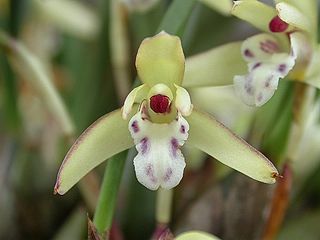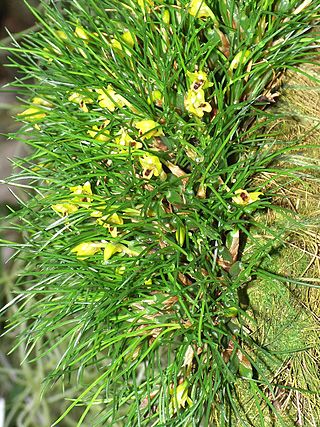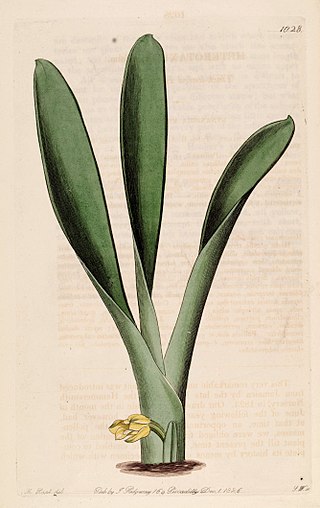
Maxillaria, abbreviated as Max in the horticultural trade, is a large genus of orchids. This is a diverse genus, with very different morphological forms. Their characteristics can vary widely. They are commonly called spider orchids, flame orchids or tiger orchids. Their scientific name is derived from the Latin word maxilla, meaning jawbone, reflecting on the column and the base of the lip of some species, that may evoke a protruding jaw.
Trigonidium, abbreviated as Trgdm in horticultural trade, was a formerly accepted genus of orchids comprising roughly twenty species found from Mexico to Brazil. As of 2023, it was considered a synonym of Maxillaria.

Nembrotha lineolata is a species of nudibranch, a sea slug, a marine gastropod mollusk in the family Polyceridae. It is found in shallow water in the Indo-Pacific. It was first described in 1905 by the Danish malacologist Rudolph Bergh. The type locality is Selayar Island, Indonesia.

Maxillaria densa, the crowded maxillaria, is a species of orchid ranging from Mexico south to Nicaragua.

Maxillaria desvauxiana is a species of orchid native to tropical South America. It is known from Bolivia, Brazil, Colombia, Ecuador, French Guiana, Guyana, Peru, Suriname and Venezuela.

Maxillaria humilis is a species of orchid native to eastern and southern Brazil.

Maxillaria lindleyana, or Lindley's maxillaria, is a species of orchid occurring from Brazil to Peru.

Maxillaria sophronitis, the sophronitis-like maxillaria, is a species of orchid found in Venezuela and northeastern Colombia.

Maxillaria tenuifolia, the delicate-leafed maxillaria or coconut pie orchid, is a species of orchid ranging from Mexico to Nicaragua and possibly Costa Rica. These plants are easy to grow if kept moist and given good air movement in a high-light windowsill of any orientation but North.

Maxillaria triloris, the three-straped maxillaria, is a species of orchid ranging from northwestern Venezuela to Ecuador.

Maxillaria neowiedii, synonyms including Maxillaria vitelliniflora and Christensonella vitelliniflora, is a species of orchid ranging from Brazil to Argentina.
Maxillaria donaldeedodii, synonym Ornithidium donaldeedodii, is a species of orchid native to Haiti. It was "discovered" in April 2010 when DNA analysis showed that a wrongly labeled orchid at the University of California Botanical Garden in Berkeley, California, was actually a distinct new species. The "new" orchid, which had been mislabeled as Maxillaria croceorubens since the 1990s, was named after orchidologist Donald D. Dod (1912–2008), who collected the specimen in the 1980s in Haiti. The new orchid was officially described in Lankesteriana, an international journal on orchidology, by authors James Ackerman of the University of Puerto Rico and W. Mark Whitten of the Florida Museum of Natural History, as Ornithidium donaldeedodii. It was transferred to Maxillaria in 2011.

Maxillaria picta is a species of plant in the orchid family native to Brazil, Paraguay and Argentina.

Maxillariinae is an orchid subtribe in the tribe Cymbidieae. It was formerly treated as the tribe Maxillarieae, and divided into a number of subtribes.

Nudol is a phenanthrenoid of the orchids Eulophia nuda, Eria carinata, Eria stricta and Maxillaria densa.

Maxillaria crassifolia, synonyms including Heterotaxis sessilis, is an epiphytic orchid widespread across the West Indies, Central America, southern Mexico, Florida and northern South America. Hidden orchid is a common name.

Maxillaria parviflora, the purple tiger orchid, is a species of epiphytic orchid native to Florida, the West Indies and through Latin America from Mexico to Bolivia.

Maxillaria montezumae, the Montezuma maxillaria, is a species of orchid native to Colombia. It is named after the Montezuma area in the Tatamá National Natural Park in the departments of Chocó and Risaralda. It is a pseudobulbous epiphyte and grows on roadside banks in páramo at elevations of 1,600 to 2,500 m.

Maxillaria aureoglobula, the golden globe maxillaria, is a species of epiphytic orchid native to Costa Rica, Colombia, Venezuela, and Brazil. Originally this species was included in the species Maxillaria rufescens but in 2002 it was described a distinct species by Eric Christenson. The type specimen was collected in Columbia although the precise location is unknown.

















